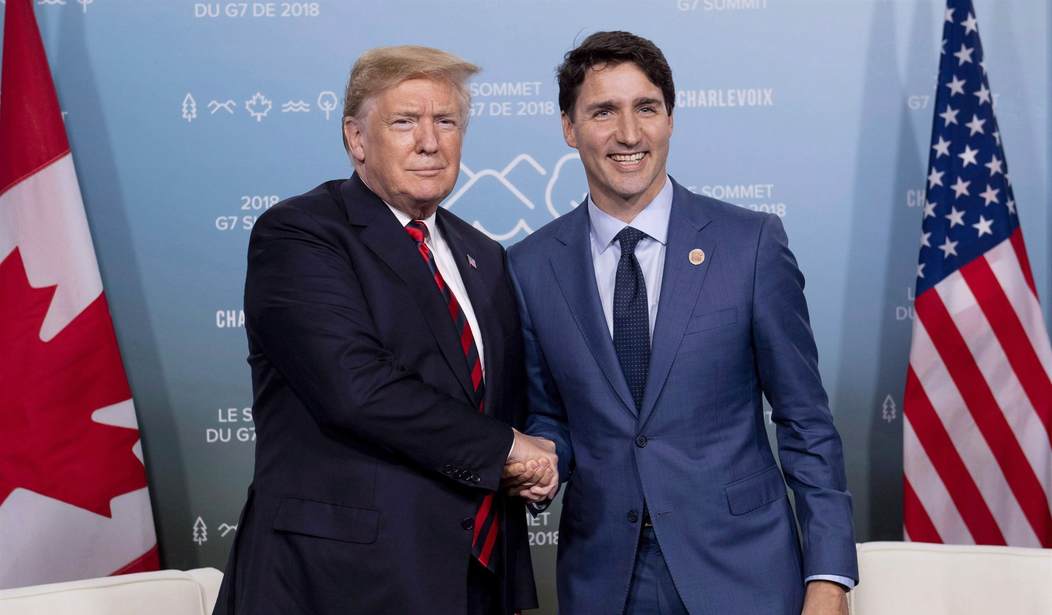Canada, our neighbor to the north, is facing a man-made crisis with Prime Minister Justin Trudeau.
A one-time progressive golden boy, PM Trudeau’s political future is increasingly grim. The press isn’t fawning over him much these days, attributing it to his “sinking popularity.”
The WSJ reports, “His Liberal Party is losing once-safe seats, and some members of his caucus say Trudeau needs to go. And the Trudeau brand is now stubbornly unpopular as Canadians say they are simply tired of him.”
The most available polling data found only 28% of Canadians approve of his administration. Over two-thirds (68%) of Canadians strongly disapprove of the self-described male feminist. This doesn’t bode well for his electoral prospects in October 2025, when Canadians will have an opportunity to vote for new leadership. Conservative opposition leader, Pierre Poilievre, is poised to challenge Trudeau and have a better working relationship with President-elect Trump.
Debanking and disarming constituents isn’t a recipe for success. Imagine that?
Recommended
Trudeau’s political demise comes at the heels of a potential tariff war between our two nations. Recently, president-elect Donald J. Trump demanded on social media that both Canada and Mexico - signers of the USMCA trade deal set to be revisited in 2026 - help him stop the flow of illegal immigrants from both sides of the border. If they fail to meet his demands, he threatened to impose a 25% tariff on imported goods. This prompted Trudeau to jet down to Mar-A-Lago to do damage control. Then president-elect Trump trolled Trudeau, in typical Trump fashion, claiming he would make an excellent 51st Governor of “the great state of Canada.”
Is Canada in a position to counter president-elect Trump’s tariffs threats? Who’s the more powerful trading partner? Trade relations between our two nations are quite strong, as Canada is a “top export destination for 36 U.S. states.” But as one conservative Canadian Member of Parliament notes, Canada is “highly dependent” and “closely intertwined” with the U.S. as its top customer and supplier. Their trade-to-GDP ratio with us is 65% while ours is at 27%.
Whatever one thinks of Trump's tariff threat on Canada, we are still in a better trading position than them. Nevertheless, in August 2024, our Bureau of Labor Statistics (BLS) reported that trade with Canada is down 0.9% in 2024. And Trump hasn’t even taken office yet. Could trading relations improve under a second Trump administration, in spite of rhetorical tariff wars occurring right now? It’s possible.
But Canada’s threat of cutting off electricity to some U.S. states isn’t helpful. Should we be worried about Canadian premiers following through with this counterthreat? On the surface, it sounds concerning and equally confounding. Why are we importing electricity from Canada when we have so much ‘liquid gold” here?
In response to Trump's tariff threats, Ontario Premier Doug Ford - brother of the late Toronto mayor Rob Ford - threatened to cut off electricity supplies to Michigan, New York, and Wisconsin. Per the most available U.S. Energy Information Administration (EIA) data on electricity imports, we imported about 38.9 million megawatt (MW) hours–with the majority, 33.2 million, coming from Canada. But when these numbers are crunched further, this merely accounts for just 1% of “annual U.S. electricity consumption.” With domestic energy production expected to be ramped up under the second Trump administration, we can generate this equivalent amount of electricity and be less dependent on Canada. The outgoing Biden-Harris administration, through their Green New Deal-lite agenda, made us more dependent on other nations for reliable energy sources.
Now to the border issue. The northern U.S. border, President-elect Trump asserts, needs to get under control. While it’s true our shared border with Canada isn’t as pressured as our southern border, Canadian officials concede “irregular crossings” have jumped significantly during Trudeau’s time in office:
After meeting with representatives of a number of Canadian and American law enforcement agencies, Quebec's Public Security Minister François Bonnardel said Tuesday that the number of irregular crossings from Canada to the U.S. has jumped significantly in the last three years.
Of the 25,000 irregular crossings into the U.S. from Canada this year, 19,000 happened between Cornwall, Ont., and Sherbrooke, Que., he said. He said there were 600 irregular crossings from Quebec in 2022 and 7,000 in 2023.
Trudeau’s likely successor, conservative leader Pierre Poilievre, agrees with Trump about the border situation and blamed the unpopular PM for inviting the brewing tariff war, stating, "The reality is that [Prime Minister Justin] Trudeau has lost control of the deficit, of immigration and of our border. In less than two months, President Trump will come into office. He's threatened the possibility of imposing tariffs unless there is action to address Trudeau's broken border.”
Like many conservatives, I’m concerned about tariff threats becoming reality and being implemented. If used as a pre-emptive threat to scare our trading partners without formal adoption, I could, however, be less concerned.
If Canada fails to acquiesce, president-elect Trump is right: they can welcome us as their liberators and become our 51st state–but with conditions and stipulations. They must get rid of gun control, adopt our constitution, and de-wokify themselves first.
Alternatively but more seriously, the more realistic path for Canada is this: elect a reformer in Pierre Poilievre who would put Canada First just as Trump plans to do with America.

























